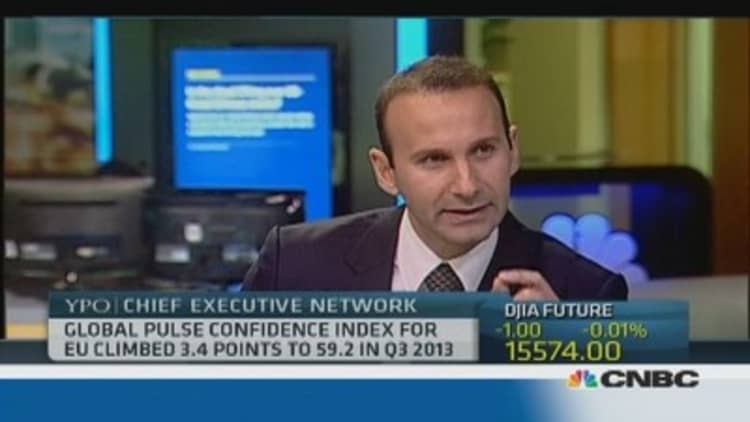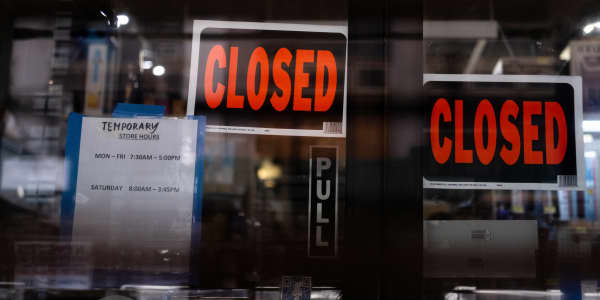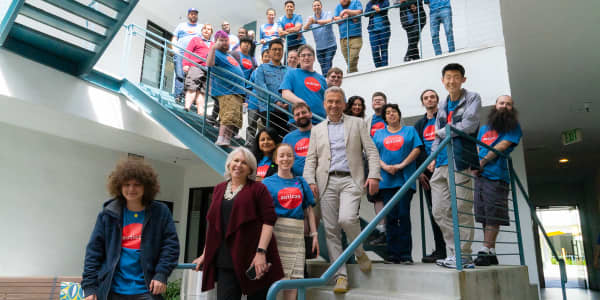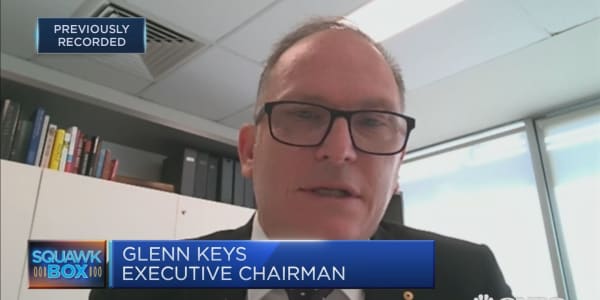What do politicians, the Federal Reserve and CEOs have in common? Apparently they have all fallen prey to the illusory feeling of déjà vu.
Congressmen have struggled with the debt ceiling issue over and over again. The Federal Reserve hasn't exited from its quantitative easing—QE—strategy, even when it has indicated a desire to wind it down. And U.S. CEOs would really love to spend the hoard of cash on their balance sheets by expanding their operations and hiring new employees, but they just can't find enough confidence in the political and economic environment to do so.
Just like the Bill Murray flick "Groundhog Day," we find ourselves day after day starting at the same economic place.
Consider the latest Young Presidents' Organization quarterly survey—the YPO Global Pulse Index.
The index reading of 60.5—a reading above 50.0 is positive—basically matches the July 2012 reading of 60.0, and the index has barely fluctuated over the past 15 months.
Alarmingly, the details underlying the survey highlight the guarded viewpoint which dominates the current CEO mindset—a mindset that hasn't changed despite the best efforts of the Federal Reserve for the past several years.
Whereas U.S. CEOs remain reasonably optimistic about their companies' future sales potential, they are no more likely to increase their employee headcount than they were 15 months ago, nor are they any more inclined to make capital investments in their businesses.
As a result—in a world of low interest rates, low wage pressures and little CEO inclination to invest in long-term projects—corporate profit margins remain at record-high levels.
Score one for stockholders and those affluent enough to own equities, but nothing to write home about if you are looking for a job, working part time or have failed to save adequately for retirement.
Here's the basic problem: The current U.S. economy is enabling the generation of record-high corporate profits. But these profits are not trickling down to workers via higher wages nor to the broader economy via increased spending on businesses' plants and equipment. With not enough jobs being created, consumers are not fueling a strong rate of economic growth.
(Read more: Are markets at risk of 1999-style Fed bubble?)
Why are CEOs displaying such inertia to hire workers and invest in their businesses?
For one, CEOs who survived the Great Recession remain reticent to aggressively grow their businesses given the trials and travails that they experienced not so long ago. Moreover, CEOs have found that using a variety of technological tools is more profitable and potentially less frustrating than keeping on hand employees who burden their businesses with health-care and Social Security costs.
In addition, continued dysfunction stemming from Washington does not engender confidence on the part of CEOs. Indeed, political irresolution further obscures a CEO's ability to accurately gauge the taxes and health-care costs attendant to running and growing a business. Without a clear road map, it's hard for a CEO to drive for corporate expansion.

To make matters worse, CEOs are currently subjected to a Federal Reserve that is sending mixed messages as to if and when the interest rate environment may change. The Fed has been overly optimistic and inaccurate in its last four years of forecasting the future rate of U.S. GDP growth.
As a result, CEOs lack a clear vision as to how strong the economy will be in the future and what their borrowing costs might be if they were to pursue expansion plans. Without clarity, it becomes more difficult for CEOs to justify long-term capital spending plans to their stockholders and board members—effectively putting their growth plans on hold.
(Read more: Fed taper in 2014? That's just 'wishful thinking')
Putting it all together, U.S. CEOs sit tight, repetitive political debates create dramatic political theater with a negative impact on the economy and the Fed is unable to unwind its QE program.
As a result, we find ourselves in a "déjà vu" economy that continues to glide at a frustratingly snail-like pace with no escape in sight.
—By Alan Zafran, managing director, First Republic Investment Management.
Survey Methodology
The quarterly electronic survey, conducted in the first two weeks of October 2013, gathered answers from 2,113 chief executive officers across the globe, including 290 in Asia. Visit www.ypo.org/globalpulse for more information about the survey methodology and results from around the world.
About YPO
CNBC and YPO (Young Presidents' Organization) have formed an exclusive editorial partnership, consisting of regional "Chief Executive Networks" in the Americas, EMEA and Asia-Pacific. These "Chief Executive Networks" are made up of a sample of YPO's unrivaled global network of 20,000 top executives from 120 countries who are on the front lines of the economy. The opinions of "Chief Executive Network" members are solely their own and do not reflect the opinions of YPO as a whole or CNBC.





